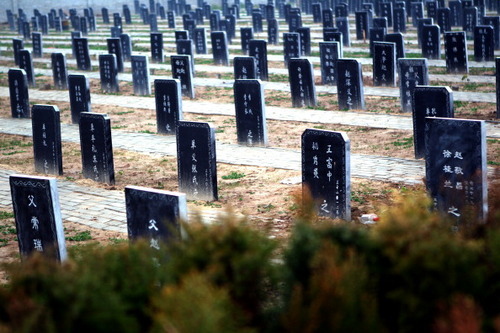
China has different funeral traditions from the West. Chinese people tend to avoid talking about death. It all looks understandable then when Fu Shou Yuan, so called “China’s first death stock”, is preparing for its floatation in Hong Kong, not many Chinese faces can be seen in the investment banks, and Citi became the sole sponsor for the firm.
Fu Shou Yuan, the largest funeral director in China, launched its IPO on December 10th. It plans to raise around $200m and sell 500m shares, 50m of which will be offered publicly. It aims to make its stockmarket debut in Hong Kong by December 20th to become China’s first funeral operative that goes public.
Fu Shou Yuan, the Shanghai-based funeral services provider, was established in 1994 and now runs branches in Shanghai, Chongqing, Hefei and five other cities. In 2008, it was listed among “The Top 10 Cemeteries in the World” by FIAT-IFTA, the world organisation of funeral operative, and was honoured as “the most beautiful cemetery in the East”. The annual revenue and net profit of the company in 2012 reached 480m yuan and 124m yuan, respectively. An 87% of its revenue came from selling cemeteries and tombstones, while a 13% came from funeral services.
The forecast issued by UBS showed Fu Shou Yuan’s annualised rate of net profit in the coming three years will rise to 29%. UBS claimed a reasonable valuation of the firm is between HK$6.3bn and 7.8bn. The forecast of Fu Shou Yuan’s PE in 2014 on average is between 22.6 to 28, while its first four peers in the global market set their 2014 PE at 18.6. It seems, at least, UBS firmly believes the “China’s first death stock” is one that has great investment potential.
It’s hard to disagree. Benjamin Franklin can’t be more true about his words “in this world nothing can be said to be certain, except death and taxes”. This notion is widely accepted in the West and now Chinese people have to agree too. China is the biggest ageing society at present. As the 2013 Annual Report on Development of the Cause of Ageing projected, by 2013, China’s ageing population is going to peak at 202 million for the first time, an estimated 14.8% of the population.
The Funeral Green Paper, published by Ministry of Civil Affairs, noted that about 9 million people are dying every year in mainland China. The average cost of a send-off is 3000 yuan ($494)and people spend 27bn yuan ($4.5bn) a year on funeral services. Add in the cost charged for ash deposition and cemetery plots and other services, the whole funeral industry yields 200bn yuan ($33bn)every year.
Chinese people may be reluctant to discuss about death, but never hesitate to invest in the funeral industry. Quite the opposite, they show natural sense of humour when talking about life and death. Look at the headlines: “Cemetery plots: valid 20 years only”, “Values of Graves Outperform Property” and “Graves Cost More, Scatter Ashes At Sea Is the New Option” . Some people also mused that “We should live long and well because we can not afford to die.” Behind those cries are bitter social context.
Still, China’s funeral industry is far from mature. It is neither non-profit nor free from government meddling so there is no talk of fully-marketized running. The flow of capital into the industry is never smooth and the policies are so flexible and seeking an advantage is easy. Maybe it is the unconditional respect for the death, which is rooted in Chinese traditional culture, that breeds the outrageous prices charged by funeral service providers, which constantly caught the headlines. Some reports quoted an insider from China Funeral Association, “margins of funeral products can be 300%, and even 1000% or 2000% at its most. ” This is really something huge.